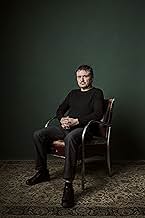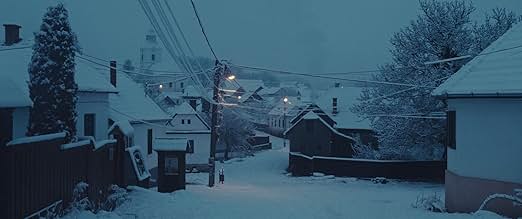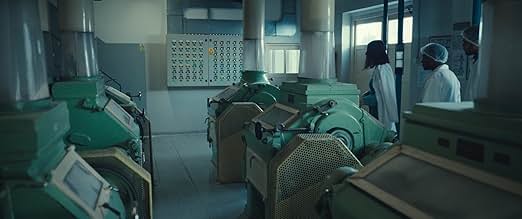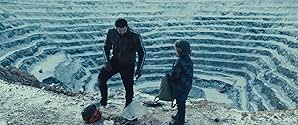CALIFICACIÓN DE IMDb
7.2/10
6.3 k
TU CALIFICACIÓN
Un análisis sin prejuicios de las fuerzas motrices del comportamiento humano cuando se enfrenta a lo desconocido, de la forma en que nos percibimos los unos a los otros y sobre cómo nos rela... Leer todoUn análisis sin prejuicios de las fuerzas motrices del comportamiento humano cuando se enfrenta a lo desconocido, de la forma en que nos percibimos los unos a los otros y sobre cómo nos relacionamos a un futuro inquietante.Un análisis sin prejuicios de las fuerzas motrices del comportamiento humano cuando se enfrenta a lo desconocido, de la forma en que nos percibimos los unos a los otros y sobre cómo nos relacionamos a un futuro inquietante.
- Premios
- 7 premios ganados y 18 nominaciones en total
Endre Rácz
- Tibi
- (as Rácz Endre)
- Dirección
- Guionista
- Todo el elenco y el equipo
- Producción, taquilla y más en IMDbPro
Opiniones destacadas
It's been half a decade since Cristian Mungiu's previous film, the excellent Bacalaureat/Graduation, and there's a bit of its thematic DNA in his most recent work. The movie goes beyond that though by exploring a real event which left its mark on Romanian society a few years ago, an event littered with prejudice and xenophobia. R. M. N. Is a bit messy and concludes in an unsatisfying fashion, but rewards the viewer with a layered experience.
From the get-go, there's a coldness to R. M. N. (Romanian abbreviation for Magnetic Resonance Imaging) that you can't shake - it's visual, it's seasonal and it's in the lead character, a monosyllabic bear of a man named Matthias. After an incident occurs while working abroad, he returns home, where more coldness awaits him, as he's met by a distant wife, an emotionally stifled child and a circumspect lover. His home village, set between mountains and forests, stands out by being multiethnic - predominantly Hungarians and Romanians, but also some Germans, like Matthias. The interaction between Mungiu's characters is fascinating to watch, as they transition seamlessly between languages, portraying a well-knit, burgeoning community. It is only after a couple of Sri-Lankan workers arrive to work at the local bakery that the the xenophobe's nest starts stirring.
The movie has a strong build-up, creating a tense atmosphere while setting all its pieces in place. Its characters are faced with more agency than one usual sees, working the underlying beliefs and attitudes onto the screen. And when things turn, they turn quickly and viscously, yet almost unexpectedly - feeding on a sense of unexpressed resentfulness, a feeling primed by our lead's emotional literacy. Similarly to another recent Romanian movie themed around prejudices, Radu Jude's Bad Luck Banging or Loony Porn, R. M. N. Climaxes at a town meeting, where all the paper-thin-arguments you're friendly Facebook neighbour would have shared are laid bare.
To me, this is where the movie wavers. Even as Mungiu tries to maintain a less than judgmental distance from its subjects, there's something so banal and un-cinematic about this kind of stand-off, that it simply cannot carry the burden imposed by the narrative arc. The scene works in spite of this, it works because of the little details and the (un)expected escalation, but it's not a worthy pay-off to what preceded it. And the conclusion that follows it even less so, being close to the absurd in spite of striving for symbolism.
Still, R. M. N. Shouldn't leave you unimpressed. It tackles big themes with passionate interest and concern, which makes up for any shortcomings, thereby proving a worthy addition to Mungiu's impressive catalogue of films.
From the get-go, there's a coldness to R. M. N. (Romanian abbreviation for Magnetic Resonance Imaging) that you can't shake - it's visual, it's seasonal and it's in the lead character, a monosyllabic bear of a man named Matthias. After an incident occurs while working abroad, he returns home, where more coldness awaits him, as he's met by a distant wife, an emotionally stifled child and a circumspect lover. His home village, set between mountains and forests, stands out by being multiethnic - predominantly Hungarians and Romanians, but also some Germans, like Matthias. The interaction between Mungiu's characters is fascinating to watch, as they transition seamlessly between languages, portraying a well-knit, burgeoning community. It is only after a couple of Sri-Lankan workers arrive to work at the local bakery that the the xenophobe's nest starts stirring.
The movie has a strong build-up, creating a tense atmosphere while setting all its pieces in place. Its characters are faced with more agency than one usual sees, working the underlying beliefs and attitudes onto the screen. And when things turn, they turn quickly and viscously, yet almost unexpectedly - feeding on a sense of unexpressed resentfulness, a feeling primed by our lead's emotional literacy. Similarly to another recent Romanian movie themed around prejudices, Radu Jude's Bad Luck Banging or Loony Porn, R. M. N. Climaxes at a town meeting, where all the paper-thin-arguments you're friendly Facebook neighbour would have shared are laid bare.
To me, this is where the movie wavers. Even as Mungiu tries to maintain a less than judgmental distance from its subjects, there's something so banal and un-cinematic about this kind of stand-off, that it simply cannot carry the burden imposed by the narrative arc. The scene works in spite of this, it works because of the little details and the (un)expected escalation, but it's not a worthy pay-off to what preceded it. And the conclusion that follows it even less so, being close to the absurd in spite of striving for symbolism.
Still, R. M. N. Shouldn't leave you unimpressed. It tackles big themes with passionate interest and concern, which makes up for any shortcomings, thereby proving a worthy addition to Mungiu's impressive catalogue of films.
Not sure what the message of the movie was supposed to be. There are two separate stories, one with a kid who saw something scary and is not able or willing to speak anymore after it, the second with a couple of immigrant workers who are not welcomed by the locals in the village.
Not much is happening in any of the stories, and definitely nothing that has not been depicted better in other movies.
The end of the movie is really, really confusing, with a woman who is asking forgiveness for something, not clear at all what exactly, then some bear figures hiding in the woods around her house... The movie left me with the sensation that I just wasted two hours that I could have spent in a better way.
Not much is happening in any of the stories, and definitely nothing that has not been depicted better in other movies.
The end of the movie is really, really confusing, with a woman who is asking forgiveness for something, not clear at all what exactly, then some bear figures hiding in the woods around her house... The movie left me with the sensation that I just wasted two hours that I could have spent in a better way.
The director as usual deals with gray areas of morality. No one is all good or bad. All characters - with all their qualities and vices - are simply put, human.
He is able to treat topics such as immigration, racism, east-west, identity politics, etc. Without falling into the trap of being judgmental or prescriptive. No slogans here. All issues depicted naturally through the normal flow of normal people's lives...
The single take in the town hall - which goes on for minutes - must be a milestone in film history! I cannot imagine how many takes he must have had to create this virtually impossible scene. In a single take, so many characters engaging in the liveliest dialogue for minutes...it was breathtaking.
R. M. N. Was 2 hours of a visual and dramatic feast. I cannot wait to see what this great director will produce for us next.
He is able to treat topics such as immigration, racism, east-west, identity politics, etc. Without falling into the trap of being judgmental or prescriptive. No slogans here. All issues depicted naturally through the normal flow of normal people's lives...
The single take in the town hall - which goes on for minutes - must be a milestone in film history! I cannot imagine how many takes he must have had to create this virtually impossible scene. In a single take, so many characters engaging in the liveliest dialogue for minutes...it was breathtaking.
R. M. N. Was 2 hours of a visual and dramatic feast. I cannot wait to see what this great director will produce for us next.
Greetings again from the darkness. Welcome to 'Hypocriteville". Or the town of Bigotry. Or Xenophobia City. Regardless how vile each of these labels might be, they each fit in the Transylvania community at the heart of writer-director Christian Mungiu's latest film. Of course, as with most derogatory labels, the accused would never admit the shoe fits, and paraphrasing Shakespeare, would likely protest too much. Mungiu's brilliant 2007 Palme d'Or winner 4 MONTHS, 3 WEEKS AND 2 DAYS was inexplicably not nominated for a Best Foreign Language Oscar, and he proves again his unique mastery of the medium.
Our introduction to Matthias (Marin Grigore) occurs as he violently head butts his rude supervisor after being disrespected. Matthisas then returns to his home community where he encounters Ana (Macrina Barladeanu), the mother of his young son. Rudi (Mark Edward Blenyesi) is 8 years old, and he has recently witnessed something in the forest that has frightened him into silence. Ana does what she can to comfort him, while Matthias pushes him to 'man up' and face his fears. Matthias also re-connects with his former lover, Csilla (Judith State), who is the manager of the local bakery in town.
Csilla is working diligently to hire more employees at the bakery in order to qualify for grant money. The problem is that no locals want to work for minimum wage. Instead, many locals head to Germany and other areas for higher paying jobs, and the conflict arises when Csilla hires a couple of men from Sri Lanka. It's at this point where this mishmash of citizens begins their racist rants ... this despite being a mixed community where many friends and family member have headed out to find jobs in other areas. "Not in my backyard" is a phrase used so often in communities fighting against some cause, and that's exactly what's happened here.
Mungiu's excellent film peaks with a 15 minute (or more) single take scene - a town hall meeting where a couple of dozen citizens speak out showing their small-mindedness. It's painful to watch, yet also mesmerizing. Csilla and Matthias are front and center for the scene and both are superb, especially Csilla's facial reactions and Matthias' cowering (this after flaunting his powerful masculinity for so much of the film). By the time this scene concludes, this viewer was mentally exhausted while also being in awe. It's this reaction which makes that final scene so confounding and seemingly out of place. Mungiu taps into the human behavior that we so often question these days, and he does so in a way that never preaches or judges. It's truly exceptional filmmaking ... except that final scene.
Opens April 28, 2023.
Our introduction to Matthias (Marin Grigore) occurs as he violently head butts his rude supervisor after being disrespected. Matthisas then returns to his home community where he encounters Ana (Macrina Barladeanu), the mother of his young son. Rudi (Mark Edward Blenyesi) is 8 years old, and he has recently witnessed something in the forest that has frightened him into silence. Ana does what she can to comfort him, while Matthias pushes him to 'man up' and face his fears. Matthias also re-connects with his former lover, Csilla (Judith State), who is the manager of the local bakery in town.
Csilla is working diligently to hire more employees at the bakery in order to qualify for grant money. The problem is that no locals want to work for minimum wage. Instead, many locals head to Germany and other areas for higher paying jobs, and the conflict arises when Csilla hires a couple of men from Sri Lanka. It's at this point where this mishmash of citizens begins their racist rants ... this despite being a mixed community where many friends and family member have headed out to find jobs in other areas. "Not in my backyard" is a phrase used so often in communities fighting against some cause, and that's exactly what's happened here.
Mungiu's excellent film peaks with a 15 minute (or more) single take scene - a town hall meeting where a couple of dozen citizens speak out showing their small-mindedness. It's painful to watch, yet also mesmerizing. Csilla and Matthias are front and center for the scene and both are superb, especially Csilla's facial reactions and Matthias' cowering (this after flaunting his powerful masculinity for so much of the film). By the time this scene concludes, this viewer was mentally exhausted while also being in awe. It's this reaction which makes that final scene so confounding and seemingly out of place. Mungiu taps into the human behavior that we so often question these days, and he does so in a way that never preaches or judges. It's truly exceptional filmmaking ... except that final scene.
Opens April 28, 2023.
This is not a film for those of us who watch movies casually. If you pay close attention to the gloriously intricate details of this film, the ending will leave you speechless and full of ruminations for days (maybe even weeks) to come.
The characters in this film are not cartoonish one-note ideas -- they're complex full human beings. We have a brilliant anti-hero as our lead, a morally-confused "working woman" type as our second lead, and a village whole as our third lead. Think this sounds boring? Give the film a chance and let it seep in. It's firing on all cylinders - beautiful, moody, dark, socially-relevant without being preachy or preening.
Mungiu is a master and has yet to make a bad movie.
The characters in this film are not cartoonish one-note ideas -- they're complex full human beings. We have a brilliant anti-hero as our lead, a morally-confused "working woman" type as our second lead, and a village whole as our third lead. Think this sounds boring? Give the film a chance and let it seep in. It's firing on all cylinders - beautiful, moody, dark, socially-relevant without being preachy or preening.
Mungiu is a master and has yet to make a bad movie.
¿Sabías que…?
- TriviaMungiu named the film after a Romanian acronym for -nuclear magnetic resonance-, as the film is "an investigation of the brain, a brain scan trying to detect things below the surface".
- Bandas sonorasYumenji's Theme
Composed by Shigeru Umebayashi for Deseando amar (2000)
Selecciones populares
Inicia sesión para calificar y agrega a la lista de videos para obtener recomendaciones personalizadas
- How long is R.M.N.?Con tecnología de Alexa
Detalles
- Fecha de lanzamiento
- Países de origen
- Idiomas
- También se conoce como
- МРТ
- Locaciones de filmación
- Panemar - Râtu Mare FN, Jucu, Cluj County, Rumanía(baking factory)
- Productoras
- Ver más créditos de la compañía en IMDbPro
Taquilla
- Total en EE. UU. y Canadá
- USD 46,360
- Fin de semana de estreno en EE. UU. y Canadá
- USD 6,121
- 30 abr 2023
- Total a nivel mundial
- USD 738,520
- Tiempo de ejecución
- 2h 5min(125 min)
- Color
- Relación de aspecto
- 2.39 : 1
Contribuir a esta página
Sugiere una edición o agrega el contenido que falta























